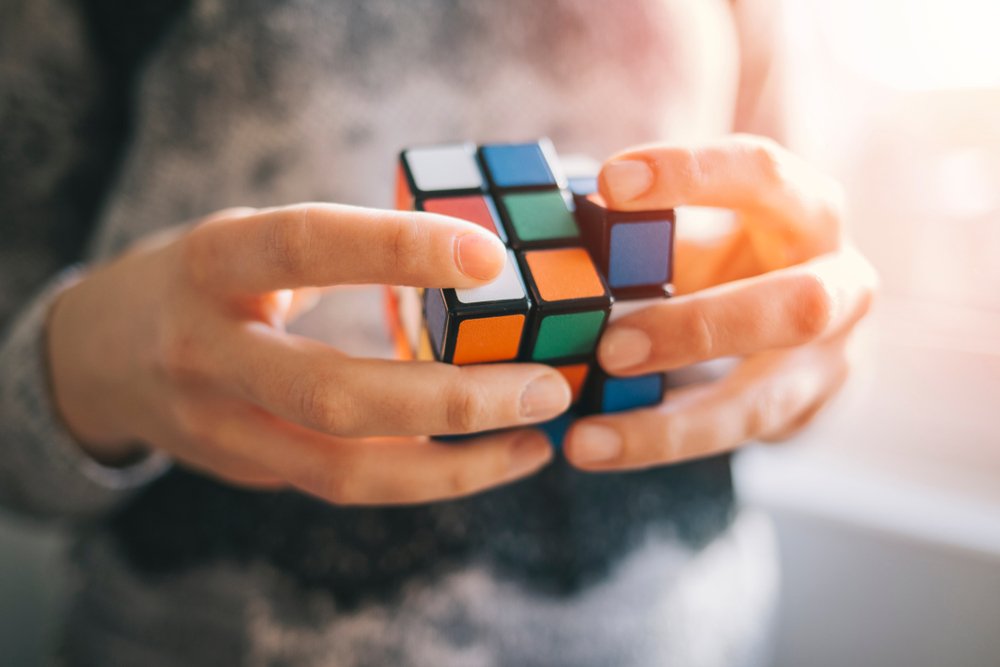Last Updated on January 25, 2024 by Gamesver Team and JC Franco

You don’t have to be a genius to solve a Rubik’s Cube, contrary to what most people believe. Although it is not simple nor easy, you can learn to solve it through the countless tutorials available online. There are a few traits that can help make your endeavor easier.
Several people have been working on completing the Rubik’s Cube since the ’80s but have not progressed beyond one side. While it might seem simple, the Rubik’s Cube challenges people’s minds across the globe. Solving the Cube improves your cognitive abilities, increases your ability to work under pressure, and helps with problem-solving.
Anyone can learn a new skill through hard work, but there will always be new challenges ahead that require additional determination. Rubik’s Cube might not be your cup of tea, but if you are still interested in trying it out, master what you lack. Here’s what you need to take on the challenge.
15 skills you might need to help you crack the Rubik’s Cube:
1. Attention
Rubik’s cubes help children and adults to concentrate better. It’s a controlled process of twisting and turning, and you can’t allow distractions to bog down your progress since they can break the momentum, and you may lose sight of the algorithms.
2. Hand-eye coordination
While solving a Rubik’s Cube, you will need to have strong hand-eye coordination because this is a skill that will determine your success. Learning to coordinate your visual reflexes with hand movements will make you more able since you will execute more complex tasks.
3. Determination
Did you know that about 6% of the population can solve a Rubik’s Cube? So if you are feeling defeated, don’t worry. There is more than 90% of people out there who feel the same way. What makes those few different from the rest? Determination.
Those who solved it didn’t give up the first time they felt frustrated about the Cube. They kept pressing on until they found a solution. Solving Rubik’s Cubes requires a lot of will. By repeatedly switching between different combinations of faces and cells, you will intensify your determination to solve the puzzle.
4. Math
This funny-looking toy is actually a mathematical puzzle. There are 43 quintillion combinations, but one solution. So, in order to solve a Rubik’s Cube fast (Speedcubing), you’ll most likely need to know about algorithms, permutation, geometrical symmetry, among other mathematical concepts.
5. Problem-solving
There is no shortcut to solving the Rubik’s Cube. It involves a mental methodology and careful planning. The problem must be broken down into more manageable steps before being solved. One example is twisting and turning the Cube to solve it. Additionally, this puzzle will require you to interpret it and devise a course of action to solve it.
6. Observational skills
The more you interact with a Rubik’s Cube, the more you will come to appreciate taking notes and experimenting, which will give you knowledge and expertise to help you complete it. In addition, you will start drawing conclusions and make well-thought but time-consuming moves that will take you closer to the goal.
7. Patience

To solve a Rubik’s Cube, you will need patience and calm. If you’re not familiar with this puzzle, it might come to a point where you feel stuck and want to quit. In any case, patience will allow you to seek out more information to find the answer.
It is not easy for beginners to learn even the simplest of algorithms, but those who persist and remain patient will eventually solve the puzzle. Getting overwhelmed will not take you anywhere.
8. Tolerance to distress
Tolerance to distress comes hand in hand with patience. If you are impatient or prone to anger, Rubik’s Cubes are not for you unless it’s a skill you want to develop. You will need to remain calm to continue to focus on your goal to solve the puzzle.
9. Emotional intelligence
We feel, act, and think from our emotions. Rubik’s Cubes challenge you to think differently, imagine, and solve problems the entire time you’re twisting and turning the Cube. You need to control impulse feelings of frustration and manage your own emotions to play with a Rubik’s Cube healthily.
Rubik’s Cubes stimulate emotional chemicals by promoting problem-solving strategies. Although the goal is to bring all six faces back to their original states, you should also have fun while fiddling with the Cube.
10. Gross and fine motor skills
To solve the Rubik’s Cube, players should constantly move their hands and fingers, making several gestures and movements. As you twist, turn and place each side of the Cube in alignment with the rows, columns, and colors, you’ll be working on your gross and fine motor skills.
11. Pattern recognition
While it might come naturally, while you are fiddling with a Rubik’s Cube, you are also matching the information you are seeing in the Cube you are handling with information that’s retrieved from your memory. This skill is critical if you are speedcubing.
12. Spatial awareness
The Rubik’s Cube is a three-dimensional object. To solve it, you need to understand the concepts of over, under, and behind. You must visualize and then follow through with a step-by-step process. In cubing, you constantly rearrange the parts and test your ability to perceive space by continually rearranging them.
13. Finger agility
You’ll need to use your fingers all the time when trying to solve a Rubik’s Cube. They are your tools to reach your goal. It will require you to have strong fingers to improve your speed. You will also need a better reaction time coupled with increased agility and attention span.

14. Creativity
If you want to have an advantage against your opponents, you need to be creative in developing your algorithms and solving some aspects of the puzzle. Rubik’s Cubes come in a staggering 43 quintillion combinations, so solving them takes a lot of skill.
In some cases, it feels like we’ll be pulling our hair out because we can’t solve the puzzle. No matter what we try, it never seems to make a difference. At these times, our creative juices start flowing, and we start thinking outside the box.
15. Speed
If you’re a speedcuber or trying to get into the sport, this skill is specifically crucial for your success.
This is when you will combine all other skills required to solve a Rubik’s Cube and try to do it as fast as you can. You will need to do several movements per second. Try to picture how many movements the Rubik’s Cube record holder does per second. Of course, algorithms exist to give you strategies to shorten the process.
All in all
Despite its simplicity, this puzzle is quite complex and requires several cognitive skills to solve. Rubik’s Cube solving can speed up your thinking and is, thus, a valuable skill that can make you sharper.
Also, when people are challenged to solve problems effectively, they are more likely to persevere without succumbing to instant gratification. Perseverance and self-discipline at times of loss teach individuals the true meaning of success. So, before you throw it back into your toy bin due to frustration, pick up a tutorial online and put your skills to work.

